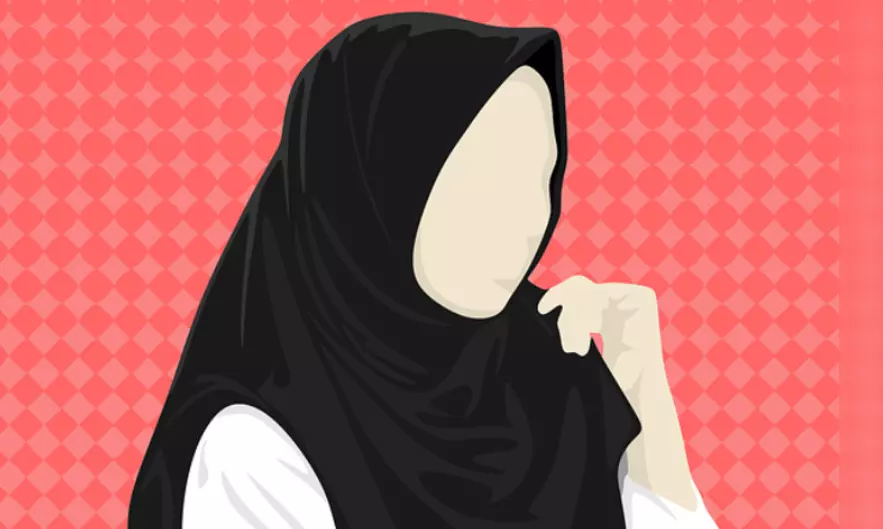
For BJP 'Hijab' is a religious statement to deny education
text_fieldsKarnataka, where Muslim girl students face a discrimination over wearing headscarves in classes, is witnessing a campaign called 'I Love Hijab' in protest against the BJP-ruled state government's religious argument.
A group of students in Mysuru district came up with 'I Love Hijab' campaign to express their solidarity with those female students who have been stopped from attending classes wearing 'Hijab' in some parts of the state.
Muslim female students have been attending different levels of educational institutions wearing hijab as their prescribed uniform without any objection for decades until some government educational institutions in southern part of Karnataka blocked girls at the gates.
The colleges mandated that the girls will be allowed inside the classrooms only after removing their hijab, a religious obligation for Muslim women. Though the educational institutions insisted that it is implementing the rule of the uniform, the BJP government finds hijab as a religious statement, against which it has declared a war.
It is the BJP government that found a religious aspect in the hijab, which is common among Muslim women and which, otherwise, does not make any visual harm to others. The party vehemently said it will oppose the 'Talibanisation' and warned the protesting girl students that they would not be getting education until or unless they remove the hijab.
The students who were obstinate in their stand insisted on going to whatever extent needed to protect their constitutional right to practise religion in the democratic country.
It is evident from the statements made by BJP leaders and Ministers in respect of the Hijab issue that it is not the uniformity of all students but the factor of religion that bothers them most. When the reality is that only the prescribed syllabus is taught in educational institutions, the Home Minister Araga Jnanendra's statement that "no one should come to classroom to practise religion" strengthens the doubts that the issue will be unlikely to be resolved in near future.
The appearance of some students with saffron shawls, following the eruption of hijab controversy, can only be seen as an attempt to justify the decision the government had taken against the Hijab.
The other side of the Hijab row
Those who are joining hands against the hijab in classrooms are found to be blindfolded from seeing the religious aspects of other symbols the non-Muslim students are used to wearing. While Bindi, Rakhi, crucifix and Sikh turbans are treated as innocuous, only the Hijab is found to be a religious symbol and to be seen as objectionable.
Congress leader and MP, Shashi Tharoor, very aptly shot a question, laying bare the presence of other religious symbols commonly worn in the educational institutions, raising no concerns.
"It's been a strength of India that everyone is free to wear what they want. If the hijab is disallowed, what about the Sikh turban? The Hindu's forehead mark? The Christian's crucifix? This college is going down a slippery slope. Let the girls in. Let them study. Let THEM decide," ran one of tweets he made on the Hijab row in Karnataka.
As more colleges and educational institutions in the state began to deny entry to girl students with hijab on in the classrooms, former Karnataka Minister and Leader of Opposition Siddaramaiah stood up, upholding the very right of students to wear the hijab. Calling it their fundamental right, Siddaramaiah said that preventing them from attending classes, was a violation of their right to education.
While the issue seems to be snowballing into a major controversy spreading to other educational institutions, the Karnataka Chief Minister Bommai urged the educational institutions to follow existing uniform related rules, until the High Court comes out with an order in this regard, next week.
One of the students moved the High Court against headscarf ban in the colleges. The court also agreed to hear the student's plea, which contended that the institution forcing her to remove the hijab to attend classes was a violation of her fundamental right.
However, the plea in the High Court by the girl has also been questioned by the Minister for Power, Kannada and Culture V. Sunil Kumar, with an implicit allegation about those who support her. He asked, "how can students from poor backgrounds move to the High Court? Who is behind them?"
Who is communalising the issue?
Congress leader Rahul Gandhi also expressed his dissent over the Hijab issue. He is of the opinion that the restriction on the hijab clad girls in the classrooms yields nothing but depriving them of their future.
"By letting students' hijab come in the way of their education, we are robbing the future of the daughters of India. Ma Saraswati gives knowledge to all. She doesn't differentiate," Rahul Gandhi tweeted.
Responding to Rahul Gandhi's tweet, the Karnataka BJP alleged that the Congress leader is communalising the education.
"By communalising education, Congress co-owner Rahul Gandhi has once again proved that he is dangerous to the future of India. If hijab is very much essential to get educated, why doesn't Rahul Gandhi make it mandatory in states ruled by Congress?" the Karnataka BJP tweeted.
From the statements the BJP leaders and the Karnataka government have made in regards to the Hijab issue, it is evident who was the first one who brought religious factor into the educational system and who wanted the issue to be propagated as a religious issue.
A system that has been running smoothly without any hurdles or issue for decades suddenly is being publicised, as has been overtaken by Muslims. The politics behind these hollow issues are only being played to hide the shortfalls of the government and to derail the public attention from simmering issues of governance.
























